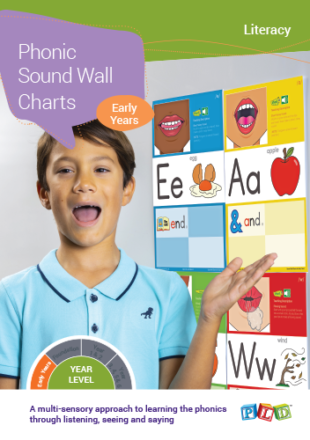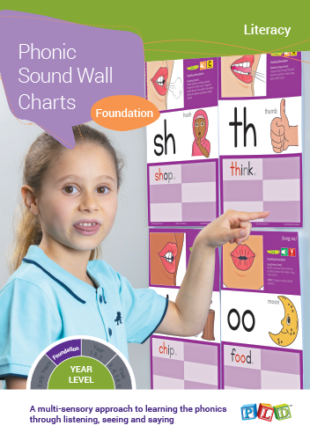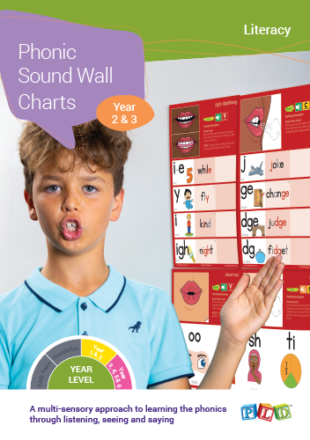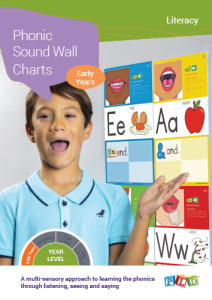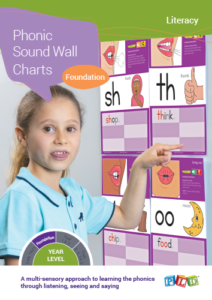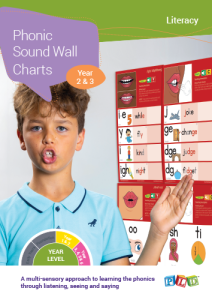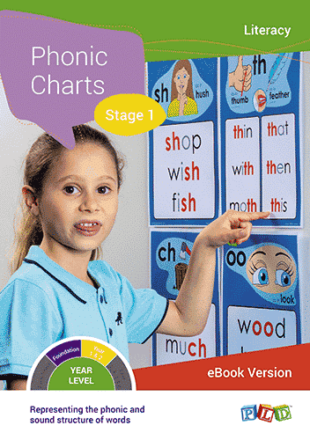| Book |
Full Set of Phonic Sound Wall Charts
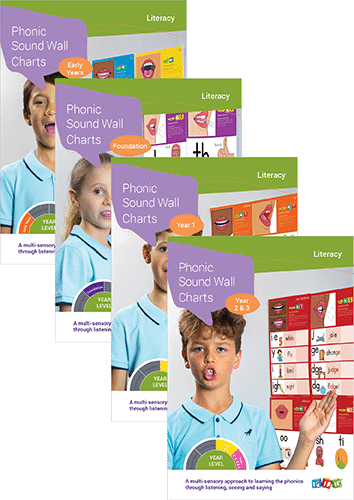

This bundle has been discounted 15% off the full retail price and includes:
- Phonic Sound Wall Charts for the Early Years
- Phonic Sound Wall Charts for Foundation
- Phonic Sound Wall Charts for Year 1
- Phonic Sound Wall Charts for Year 2 & 3
What are the features of PLD’s Sound Wall Charts?
Teaching the 44 speech sounds of the English language requires accurate modelling and articulation, pedagogy that sound walls support. The PLD sound wall charts focus on the phonemes (or individual sounds) of speech and link to the PLD scheduled phonic sequence. Each phoneme-specific chart features:
- Charts focused upon the phonemes and phonics for the Early Years to Year 3 classes.
- The corresponding visual of a mouth.
- A simple description (e.g. tongue tapping sound, lip popping sound, peeking tongue sound, coughing or huffing sound)
- A detailed description.
- Icons identifying if the phoneme is a long or short, quiet or noisy, or vowel or consonant sound.
- Areas to add words (making the charts interactive rather than static).
- The related phonic concepts for each year level.
What is a sound wall display?
A sound wall is an interactive display of phonic concepts and words that is organised by and/or emphasises individual sounds (phonemes). Commonly there is one wall for consonants and one for vowels.
Sound walls focus on the formation of phonemes which gives young students a structure that helps them understand the foundation of language and written literacy. As we know from current research about the science of reading, children learn to read through the application of orthographic mapping, a speech-to-print process where letters are mapped to known speech sounds. Teachers need to harness this modern understanding by using sound wall displays as a teaching and learning tool in their classrooms to support the process of learning to read and spell.
Individual Sound Wall Charts:
- Phonic Sound Wall Charts for the Early Years (26 A4 coloured charts which focus on the alphabet)
- Phonic Sound Wall Charts for Foundation (42 A4 coloured charts which focus on the alphabet and Stage 1 digraphs)
- Phonic Sound Wall Charts for Year 1 (49 A4 coloured charts which focus on Stage 1 & Stage 2 digraphs)
- Phonic Sound Wall Charts for Year 2 & 3 (71 A4 coloured charts which focus on Stage 1, Stage 2 & Stage 3 digraphs)
Full Set of Phonic Sound Wall Charts – School Licence


Select your school size
Extra small
(<49 students)
Small
(50-149 students)
Medium
(150-349 students)
Large
(350+ students)
This is a PLD Whole School Licence resource. By purchasing this licence, this program will be accessible as a digital flipbook that will be stored in your secure account on the PLD website. The program will be accessible as a digital flipbook that teachers can access on any device for as long as the licence is active. A School Licence is valid for 12 months from the date of purchase and can be shared with all staff employed at the school. We highly recommend that either the Principal, Deputy Principal or a member of the admin team purchase the School Licence in order to manage the account and its users. For more information, visit our Whole School Licence FAQ.
What are the features of PLD’s Sound Wall Charts?
Teaching the 44 speech sounds of the English language requires accurate modelling and articulation, pedagogy that sound walls support. The PLD sound wall charts focus on the phonemes (or individual sounds) of speech and link to the PLD scheduled phonic sequence. Each phoneme-specific chart features:
- Charts focused upon the phonemes and phonics for Early Years to Year 3 classes.
- The corresponding visual of a mouth.
- A simple description (e.g. tongue tapping sound, lip popping sound, peeking tongue sound, coughing or huffing sound)
- A detailed description.
- Icons identifying if the phoneme is a long or short, quiet or noisy, or vowel or consonant sound.
- Areas to add words (making the charts interactive rather than static).
- The related phonic concepts for each year level.
What is a sound wall display?
A sound wall is an interactive display of phonic concepts and words that is organised by and/or emphasises individual sounds (phonemes). Commonly there is one wall for consonants and one for vowels.
Sound walls focus on the formation of phonemes which gives young students a structure that helps them understand the foundation of language and written literacy. As we know from current research about the science of reading, children learn to read through the application of orthographic mapping, a speech-to-print process where letters are mapped to known speech sounds. Teachers need to harness this modern understanding by using sound wall displays as a teaching and learning tool in their classrooms to support the process of learning to read and spell.
This set contains the four Phonic Sound Wall Charts for Early Years to Year 2/3. Click on each of the links below if you wish to view the stages individually.
Sound Wall Charts in this school licence range:
- Phonic Sound Wall Charts for the Early Years (26 A4 coloured charts which focus on the alphabet)
- Phonic Sound Wall Charts for Foundation (42 A4 coloured charts which focus on the alphabet and Stage 1 digraphs)
- Phonic Sound Wall Charts for Year 1 (49 A4 coloured charts which focus on Stage 1 & Stage 2 digraphs)
- Phonic Sound Wall Charts for Year 2 & 3 (71 A4 coloured charts which focus on Stage 1, Stage 2 & Stage 3 digraphs)
- Full set of Phonic Sound Wall Charts
Recommended Reading:
Books: PLD’s books may be used by the authorised purchaser within their classroom, however there are restrictions regarding modifying, copying or sharing. Full details can be found here.
School Licences: A School Licence allows access to a resource to be shared with an unlimited number of employees who are employed by the ‘Authorised purchaser’. These resources can be accessed by multiple users simultaneously and can be printed (subject to restrictions) or displayed by employees of the ‘Authorised purchaser’ within their classroom. Learn more here.
Downloadable resources & screening tools: These resources can be viewed, downloaded, printed and shared providing the resources are not modified in any way. Learn more here.
Breaches of Australian Copyright Law are taken seriously and may result in legal action being taken. Full copyright information can be found. Learn more here.
Additional information
Phonic Sound Wall Charts for Early Years
| Weight | 0.40 kg |
|---|---|
| Dimensions | 30 × 21 × 1 cm |
Phonic Sound Wall Charts for Foundation
| Weight | 0.58 kg |
|---|---|
| Dimensions | 30 × 21 × 1 cm |
Phonic Sound Wall Charts for Year 1
| Weight | 0.68 kg |
|---|---|
| Dimensions | 30 × 21 × 1 cm |
Phonic Sound Wall Charts for Year 2 & 3
| Weight | 0.40 kg |
|---|---|
| Dimensions | 30 × 21 × 1 cm |



